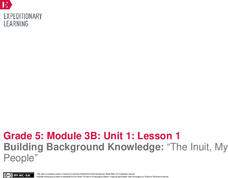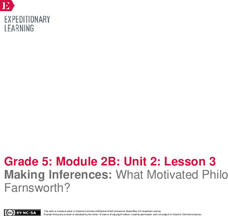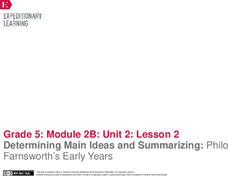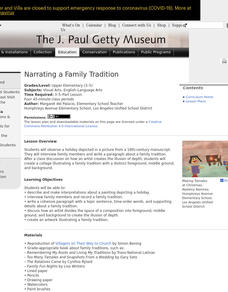EngageNY
Group Discussions and Revision: Editorial Essay
Great minds think aloud! Pupils participate in the Fishbowl protocol, discussing their opinions about the Mary River mine proposal. As they share their thoughts, peers provide feedback about their thesis and supporting ideas.
EngageNY
Peer Critique and Revision: Editorial Essay
Get those red pens ready! Using the Peer Critique protocol, scholars provide and receive feedback on their editorial essay drafts. They then use class time to work on revisions.
EngageNY
The Painted Essay for Opinion Writing: Developing a Conclusion and Adding Linking Words
Let's get colorful! Scholars use the Painted Essay technique to analyze and color code the conclusion of a model essay. Working in small groups, pupils then write a conclusion paragraph for their draft editorials about offshore drilling.
EngageNY
End of Unit Assessment, Part 2: Research and Response
Talk it out. Scholars complete part two of the assessment by participating in a World Café discussion activity. Learners circulate the room, sharing their ideas and thoughts about Canada's natural resources using quotes and paraphrasing...
EngageNY
Building Background Knowledge: Competing Views Regarding Mining on Inuit Lands
Scholars build background knowledge about mining on Inuit lands. Working in small groups, they sort information about the Inuit onto a point of view chart to determine if mining is beneficial to Inuit communities.
EngageNY
Speaking and Listening Skills: Practice
After reviewing their resources from the unit, scholars participate in multiple group discussions with a World Café activity. During the discussions, they share ideas about their focus questions pertaining to Canada's natural resources...
EngageNY
Building Background Knowledge: “The Inuit, My People”
A land with no trees. Scholars analyze the text The Inuit Thought of It: Amazing Arctic Innovations and discuss the word landscape. They imagine what it would be like living on a land with no trees. At the end, individuals work in groups...
PBS
House Warming
Things should heat up during a hands-on lesson exploring solar energy. An enlightening activity challenges young scientists to design a structure that collects solar energy efficiently. They keep track of temperature data over time and...
PBS
Plants Count
Changes to habitats mean changes to resources. Groups examine aerial maps to predict areas of low and high plant resources. After formulating a plan, they visit the areas to collect data about the plant resources and then share their...
PBS
Color Code
Don't let your brain play tricks on you! Learners test brain reaction rates while it is receiving multiple stimuli. They time each other reading a set of color words written in different colors and again when they are written in black....
PBS
Breaking Point
Leaf toughness can add to its herbivore appeal. Learns design an experiment to quantify leaf toughness and then perform their procedures. They follow the experiment with a set of questions that ask them to think about how leaf toughness...
PBS
Super Sleuths
There's no such thing as the perfect crime! Your class of sleuths are ready to investigate the trace evidence at a crime scene and compare it to a list of suspects. They use their investigative skills to record physical properties of the...
PBS
Print Hints
It would be a crime not to give the lesson a chance! An inquiry-based lesson has pupils assume the role of crime scene investigators as they make observations about shoe prints. They look for patterns in the prints such as distance and...
PBS
No Slip Grip
The force will be with you during an inquiry-based lesson focused on friction. Young scientists explore the effect of different surfaces on friction. They use rubber bands to measure the amount of force needed to move an object on the...
PBS
Insulation Station
It's all about the material. Learners experiment with different substances as they try to keep an ice cube from melting. They draw conclusions by answering a set of questions about the types and amount of material that had the best result.
EngageNY
The Painted Essay: Developing a Conclusion and Adding Linking Words
In conclusion ... this essay is the best! Scholars continue working on their painted essays by creating the conclusion. They work in groups to analyze the concluding paragraph in the model painted essay, The Electric Motor. After...
EngageNY
Making Inferences: What Motivated Philo Farnsworth?
Turn on the tube. Learners take a look at pages 10-13 of The Boy Who Invented TV. They work in groups and complete a first read to determine the gist of the section. They then reread the pages to make and revise previous inferences and...
EngageNY
Determining Main Ideas and Summarizing: Philo Farnsworth’s Early Years
Teamwork makes the dream work! Learners work in groups to analyze pages 2-9 of The Boy Who Invented TV, The Story of Philo Farnsworth. They complete a first read to determine the gist and a second read to identify main idea and provide a...
EngageNY
Building Background Knowledge: The Boy Who Invented TV, “Life before Philo”
Walk through the pictures to understand the text. Scholars analyze The Boy Who Invented TV: The Story of
Philo Farnsworth by taking a book walk and looking at the pictures. They then do a first read of Life before Philo to determine the...
EngageNY
Making Inferences About Informational Text: Science Talk on How My Insect Contributes to the Rainforest Ecosystem
We need to talk. Learners participate in a science talk by discussing the idea of how insects are important to the rainforest. They record notes about their conversations as they talk. For homework, pupils add to their field journals.
EngageNY
Science Talk
Talk like a scientist. Pupils engage in a science talk about rainforests, using a note-catcher worksheet to record important points. Next, they work in triads to synthesize their ideas about the rainforest, adding notes to a KWL anchor...
EngageNY
Readers Theater and the UDHR
Let's make connections! Using the resource, class members make connections between the Universal Declaration of Human Rights and their readers theater scripts. To finish, they complete a worksheet to evaluate the role of narration in...
EngageNY
Narratives as Theater: Esperanza Rising, from Novel to Script
Calling all thespians! Working in small groups, pupils practice reading and performing a readers theater script for the novel Esperanza Rising. Next, they read aloud passages from the novel and use an anchor chart to compare the script...
J. Paul Getty Trust
Narrating a Family Tradition
After examining a piece of art, scholars discuss what they see, paying close attention to details and space. A read-aloud introduces the topic of family traditions. Pupils interview their family members about a tradition in preparation...

























